Although I am a personal development blogger by profession, I am in no way a mental health professional. See my disclaimer for more info.
Want to start journaling, but don’t know how? No worries; I’ll teach you all about how to start journaling for personal growth.
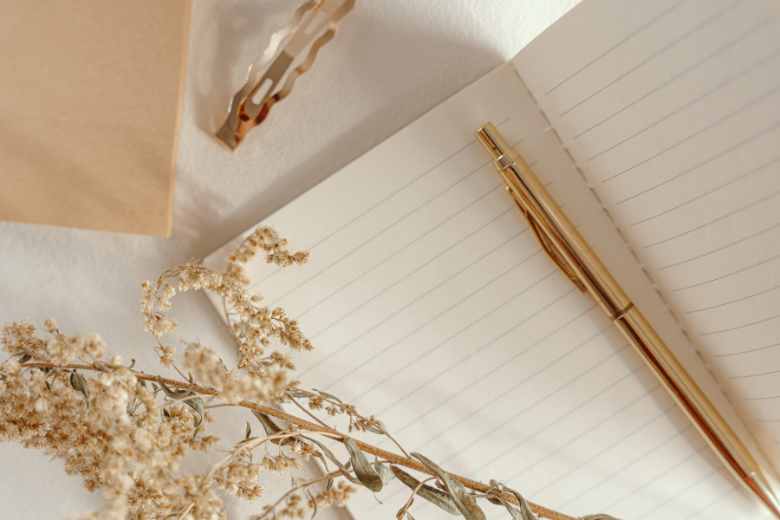
Are you looking to start journaling, but don’t know where the heck to start?
I was in your shoes at one point also. When I started my self-growth journey, I kept seeing people say that it’s important to journal. See, I was already doing it. But the problem was, I didn’t know if I was doing it “right.” Every day, I was using a bullet journal on my phone. I’d add to it every time I’d have something I wanted to talk about. It was really freeing because I tend to close myself off.
After doing this for a while and doing more research, I’ve grown to realize that I actually am doing it right. And not only that; I’ve realized that there’s no right or wrong way to do it.
That’s what we’re going to talk about today. If you’re at the beginning of your healing journey or simply want a way to track your thoughts, this post is for you. I’m going to teach you how to start journaling and make it a habit. One that you look forward to. I can’t wait to tell you how much you can learn to love and enjoy it!
Are you ready? I know I am — let’s get into it!
This post is all about how to start journaling.
What is journaling?
Let’s start with the basics. You might not even be clear on what it means to journal, so allow me to tell you.
It’s a safe place to let go of your thoughts and emotions. Anything that you’re thinking, journal about it.
If something is bothering or exciting you, you can write it down. There’s really no limits when it comes to journaling.
It’s yours — that’s what’s so special about it!
Why should you journal?
There are SO many benefits of journaling. I could go on and on! But, here are 10 reasons I think it’s worth keeping a journal:
1. improve your writing skills
When you write on a regular basis, you get better at it. It sounds pretty simple, but it’s true.
The more you write, the better of a writer you become!
I prefer to express myself through writing over talking. I have more time to think about what I want to say. Plus, I don’t feel intimidated or judged by other people.
This is why I love my journal so much. If you feel the same way, I think journaling is a good activity for you!
2. improve your critical thinking skills
When you’re journaling, you’re doing a lot of reflecting. Reflecting on the past, present, and future. This helps to build up and strengthen your critical thinking skills.
These skills are definitely important in life!
This happens with any type of journaling. But it especially happens when you’re responding to a prompt.
The prompt asks you a question and you have to think about a time in your life that’s related to that question.
Sometimes it could take a few minutes. Other times, though, it might take a bit longer.
I love this part about journaling. It really gets your brain working!
3. tap into your emotions
So… you’re probably looking into journaling because you want an emotional outlet. Well, you’ve definitely come to the right place.
Journaling is a great way to tap into your emotions and get vulnerable with yourself. Especially if you’re not a super emotional person, like myself.
If you’re afraid that someone will judge your emotions, journaling is a good place to start to conquer that fear.
See, when you express these feelings through writing, you don’t have to worry. Nobody will see these thoughts unless you allow them to.
4. track your thoughts
If you’re a forgetful person, your journal can come in clutch pretty often.
Say you think of something important. Or maybe you have a thought that you want to come back to.
Jot that down in your journal! Then, come back to that thought and expand on it at a later time.
This is perfect if you’re a creative person and you’re constantly thinking of different ideas for your projects.
5. your journal can be your best friend
Say you don’t have that many friends. Or you do have a big friend group, but nobody in that group really sticks. Know what I’m talking about?
Yeah, that really sucks. But that doesn’t have to be the case.
When you feel like you need someone (or something) to vent to, pull out your journal and write in it.
Think:
- Did you get promoted at your job?
- Did you just buy a nice new outfit?
- Did you finally reach your savings goal?
- Are you going through a mid-life crisis?
Write about it!
You don’t always have to run and tell your friends every little detail about your life. Learn to keep some things to yourself!
Now, that’s not to say a journal can replace a human being.
I don’t think anything could ever beat a good ‘ole face-to-face conversation with real emotions, eye contact, and everything.
But, your journal can be a good safe space for those times that you feel like you can’t trust someone to truly pour your heart out to.
6. catch memories
Over time, you will have written about SO much in your life. From friendships to personal challenges, you can write just about anything in your journal.
Later, you can look back on these moments and see how you’ve grown and healed as the months and years have passed.
That’s really what this is all about, honestly!
7. IMPROVE YOUR MENTAL HEALTH
Journaling can improve your mental health in a number of ways. As I’ve said, it’s a way to express your thoughts and emotions when you need to get something off your chest.
Also, writing about how you feel can help with:
- Anxiety
- Depression
- Managing stress
- Reflecting on your life
- Recovering from emotional trauma
8. TRACK YOUR GOALS
Bet you didn’t know you could use your journal as a goal tracker!
Journaling is a great way to track your goals. Every day or week, you can go into detail about your progress with your current goals.
I feel like it’s better than using a simple goal tracker that doesn’t have much information on it.
You can talk about:
- What is working
- What isn’t working
- Your plan to change certain parts of your goals
9. PLAN FOR THE DAY
I’m going to talk more about this later, but bullet journaling is a great way to plan your daily life.
You can either write your tasks in bullet points or even time blocks! This helps you stay organized and get things done quicker and more efficiently.
10. LIVE IN THE MOMENT
Instead of worrying about what the future may bring, you can focus on the now.
When you’re writing, you’re sitting with your thoughts, a pen, and a journal. That’s it!
You’re not worried about what happened yesterday, 2 hours ago, or what’s going on 2 weeks from now.
No; you’re focusing on what’s happening right in this moment.
This is a good exercise if you’re constantly anxious about the past or future. It helps you to concentrate on the now.
Types of Journaling:
You might be shocked to learn there’s different types of journaling. I sure was surprised to learn this.
Take this to your advantage! It helps to fit all types of creative styles and personalities. If you don’t like a certain method, you can try another one.
Here are 5 of my favorite types of journaling:
1. GUIDED JOURNALING
Guided journaling is a method of journaling where you respond to a journal prompt.
A journal prompt is a question that asks you to reflect on a specific time period or experience in your life. It gives you somewhere to start when you don’t know what to write about.
You can either respond directly to the prompt or use it as a starting point and then let your mind wander elsewhere.
If you’re just starting, I recommend guided journaling. It’s so simple because you look at the prompt, think for a bit, and start writing.
It’s much easier than something like free writing. You’re not just staring at a blank piece of paper and allowing it to stress you out.
That journaling method is probably better for more of an advanced writer.
2. BULLET JOURNALING
Agh, my favorite! Bullet journaling is a method where you write your thoughts in bullet points.
This is an ideal method if you want to use your journal as a daily planner.
I keep a digital bullet journal in the notes app on my iPhone. Any time I have something worth adding to it, I’ll add it as a bullet point.
These are things that I usually journal about:
- My plans for the day
- Something that I’m excited about
- Someone or something that’s bothering me
- A blog post idea
- Something I need to remember for the (near) future
- My review for an album I’m listening to for the first time (yes, I love music!)
My journal also acts as my daily planner. I love this because I don’t need a separate planner. Everything is just right there in one spot.
This method might not work for you if you’re more of a writer and like to write everything in large detail.
You’ll probably feel restricted with bullet journaling because you’re writing everything in bullet points.
If you prefer more freedom when writing, check out the next journaling method.
Free Daily Planner
My planner is the perfect simple, yet effective daily tool to help you keep your daily life in order. It includes a task list, a notes section, and my favorite part: a daily evaluation, where you reflect on your day!
To get the planner, click here now!

3. FREE WRITING
Free writing is probably the most common journaling method. It’s quite simple. You simply take a pen and some paper and start writing.
No bullet points, no prompt — none of it! Just let your mind do the magic.
Sometimes you go into it with a full heart and end up writing for 30 minutes. Other times, you have no idea what you’re going to say.
Then your writing session might only be 5-10 minutes. And that’s okay!
Write whatever is on your mind. Don’t compliate the process. If you do, that’ll stress you out.
You don’t want this to be stressful. You’re doing this to calm yourself, not get all riled up!
4. ART JOURNALING
If you’re more of a visually creative person, then art journaling might be a good choice for you.
Art journaling is a method where you describe yourthoughts and mood through art.
It’s different from other forms of journaling. Instead of writing, you’re drawing. It allows you to explore a totally different side of yourself.
I encourage you to try this sometime, even if you’re not very artistic. Get out your comfort zone and try different ways to express yourself!
No, you don’t have to be Picasso by any means. Similar to writing, just let your hand do all the magic.
Then, once you’re done, sit and admire the art you just created.
5. GRATITUDE JOURNALING
Gratitude journaling is a method where you list objects or people that you’re grateful for.
This is important so you can focus more on what you have and less on what you don’t have.
You can do this any time, with any method. Even if you prefer free writing, you can still incorporate it in a unique way.
For example, you can write a paragraph about why you’re thankful for your creativity. See, that’s how easy it is!
THINK: Which journaling method do you think will work great for you? Tell me in the comments!
What to Journal About:
I feel that you might be stuck on what to write about. You sit down and stare at that blank piece of paper. It’s like your brain just shuts off!
Where do the thoughts go?
Keep in mind that your topic doesn’t have to be anything super serious. It can be as simple as what you ate today.
The great thing about journaling is that there’s no limits.
You have a pen, some paper, and your mind. Let the pen transform your thoughts into words onto the paper.
If you’re stuck, here are 18 ideas to get those creative juices flowing. You can journal about:
- What you ate today
- Who/what made you smile today
- A dream you thought was interesting
- How you feel about the current state of the world
- A memorable childhood experience
- Something you’re feeling nervous or anxious about
- Something you’re feeling happy or excited about
- Respond to a journal prompt
- A recent breakup that’s hurting you
- Something you think you’ll forget soon
- Your plans for tomorrow
- An interesting conversation or experience you recently had
- A fear you finally conquered
- A review on your favorite book, song, movie, or TV show
- A gratitude list
- A letter to your past, current, or future self
- Someone or something that has been on your mind lately
- Your creative ideas
How to Start Journaling:
Step 1: Determine your ‘why’
First, you need to figure out why you want to start journaling. There’s a whole list of reasons to journal above this section.
But here are some main reasons you might want to make this a regular habit:
- Improve your mental health
- Track your goals
- Get to know yourself better
- Try to concentrate more
- Use it as a creative outlet
- Emotional support
- Express yourself throughout the day
- Write affirmations
Step 2: Make a schedule
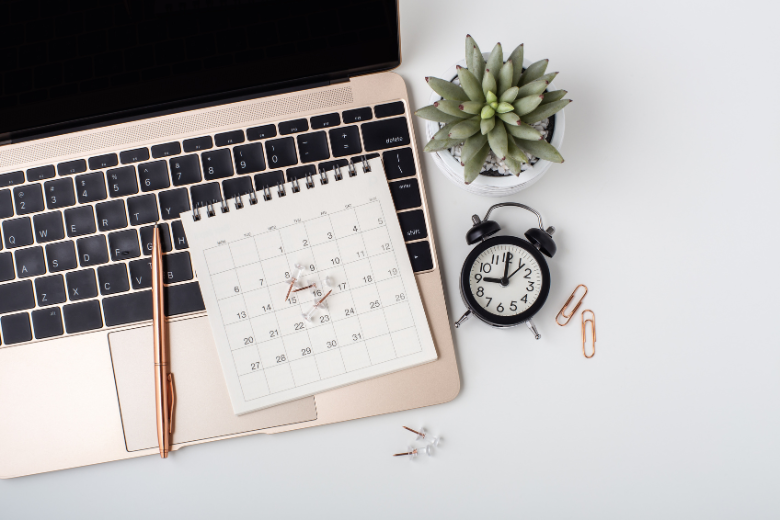
Think about how often you want to journal.
Do you want to write everyday? Or do you want to write every other day? Maybe you just want to write on a weekly basis.
Set out a time every day or week so you can write. If you have a schedule, that will help you be more consistent.
Step 3: Find a journaling method
To really enjoy journaling and all of its benefits, you have to find a method that works for you.
Earlier I talked about 5 different methods of journaling. There are even more than that, but those are the ones I recommend for beginners.
I want you to choose one and experiment with it for about 2 weeks. Make a commitment so you can see how you like it.
There’s really no right or wrong way to do it. If you think there is, you have to forget that.
The “right” way to do it is the way that works best for you and your lifestyle.
I don’t expect you to automatically fall in love with something like free writing. It’s not for everyone. I used to love it, but it takes a lot of time.
I definitely prefer bullet journaling. But I wouldn’t have learned that if I didn’t try different methods.
So, do some experimenting so you can figure out what works best for you. Once you finally do, you’ll start to enjoy writing and become more eager to do it.
Step 4: Start writing
Once you finish steps 1-3, it’s time to start writing! Use my free daily journal below to get started.
Free Daily Journal
This journal is my favorite because it includes a section to mark how you’re feeling before you start writing, plus just enough lines to let all your feelings out.
Journaling is absolutely one of my favorite ways to practice emotional/mental self care, and my free daily journal can help you do just that.
Click here to get the FREE journal now!
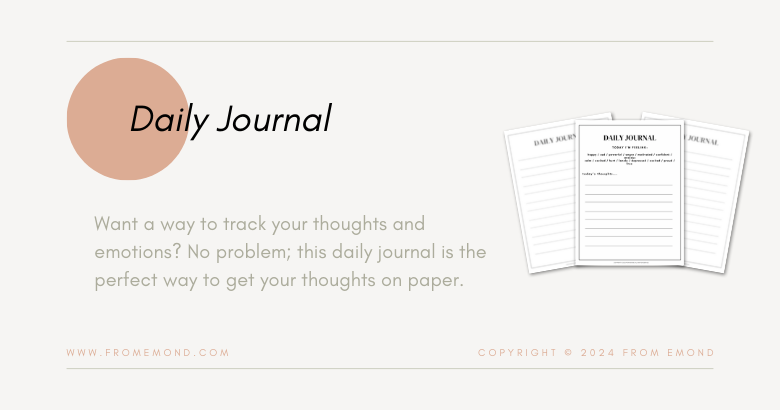
Journaling Tips:
1. Just write
I get it. You’re probably stressed because you don’t know what to write about.
But here’s the thing: you don’t always need something to write about. If that were the case, you probably wouldn’t journal that often!
Instead, sit down and let your mind guide you. This mind sound weird, but just do it. Grab a blank sheet of paper and a pen, and start writing.
It doesn’t matter whether you write for 5 or 30 minutes. As long as you dedicate time to journaling, I’d say that’s a win.
When you’re just starting, it’ll probably be hard and uncomfortable to dig deep into your emotions. You might not be used to doing something like that.
I suggest writing about:
- How your day went
- Who or what has been giving you joy lately
- What has been on your mind recently
See? It doesn’t have to be complicated.
And as I mentioned earlier, you can try bullet journaling or answering a prompt to make the process even easier (and sometimes quicker).
2. Write until you feel like stopping

Don’t feel like you have to write pages and pages of thoughts. I don’t know who told you that was a requirement to make you a good journaler.
Get that out of your head… now!
You don’t have anybody to impress (besides yourself). So don’t treat it like a high school essay. There’s no word count that you have to reach.
Just write until you feel like you’ve fully expressed yourself. This is much better than forcing yourself to keep writing even after you start to feel tired.
If you do that, it’s going to feel like a task.
Journaling should feel nothing like a task. You should enjoy it! It’s supposed to heal and free you!
I learned this from James Clear’s book, Atomic Habits. Since I learned it, I realized that I was forcing myself to keep writing past my limits.
It wrecked my creativity, but I have a new perspective now. I only write until I feel like I should take a break. It’s so much better doing it this way!
3. Don’t force yourself to write everyday
If you want to write everyday, I applaud you for that. But if you don’t, that fine also!
I don’t want you to exhaust yourself just because you feel like you have to journal every single day.
After a while, you’ll probably get tired, fall off, and then go months without journaling. All because you forced yourself to do something you really didn’t enjoy.
To avoid this, find a schedule that aligns with your needs. If you only want to journal every 3 days, I love that for you.
4. Take breaks
You won’t feel like writing all of the time. You’re going to need to take breaks every now and then.
I usually go about 2 days without journaling before I write again. I’m not mad at all with this. I don’t even take the break on purpose.
It just happens!
This gives me a chance to recoup and reflect on the past few days before I get back to writing.
I get it; writing everyday can improve your craft and mental health. But, if anything, it could make it worse if you don’t feel good doing it.
Know your limits!
5. Remember that nobody will see it
You’re probably worried that someone is going to see your vulnerable thoughts and emotions.
I can see why you think this. You’re pouring your heart into it and you don’t want people to see personal details about your life.
I mean, I wouldn’t want people seeing that kind of stuff either!
To make sure that nobody sees it, just don’t tell anyone about it. Oh, and keep it in a safe spot.
Obviously, if you tell people you have it, they’ll be eager to look in it and see what types of people and things you write about.
So don’t tell on yourself by telling people that you keep a diary.
6. It doesn’t have to be fancy
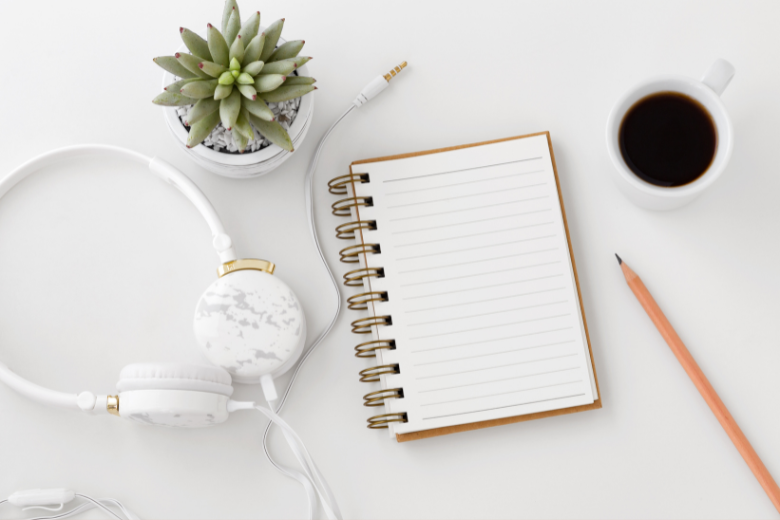
Don’t let those aesthetic bullet journals on Pinterest fool you.
Sure, you can get that decked-out bullet journal that you see all over your Pinterest feed. But, you definitely don’t have to.
Just get a cheap notebook and a pen. It’s all about what you put in the thing, after all.
I will say, aesthetics can motivate you to write in it.
But I don’t want you to sacrifice your finances for something you can buy at your local dollar store. Seriously — be smart about it!
Or better yet…
You’re reading this on your phone or laptop, right?
Go ahead and open your notes app, open a fresh document, and start typing away.
This is how I journal and I don’t know if I prefer any other way. I love it! Any time I want to document something, I pull out my phone do exactly that.
Let’s recap!
We made it to the end of the post!
Today, we talked about how to start journaling.
Journaling is a great way to improve your mental health, catch memories, concentrate, and so much more. It’s truly one of the best forms of healing, self-discovery, and self care.
And it’s amazing because it’s free! I mean, I don’t know if it could get better than that.
Use this guide to find your journaling style and make writing a habit. It doesn’t have to be everyday, but try to make a routine. I hope you’ll come to love and enjoy it!
Please remember to take time to take care of yourself!
I know, in this economy, it can be hard to find free things to do that are fun. That’s why I put together a list of 7 free self care activities to enjoy today!
In the midst of chaos, don’t forget to smile,
DeMarcus – your self care buddy
PIN IT FOR LATER:
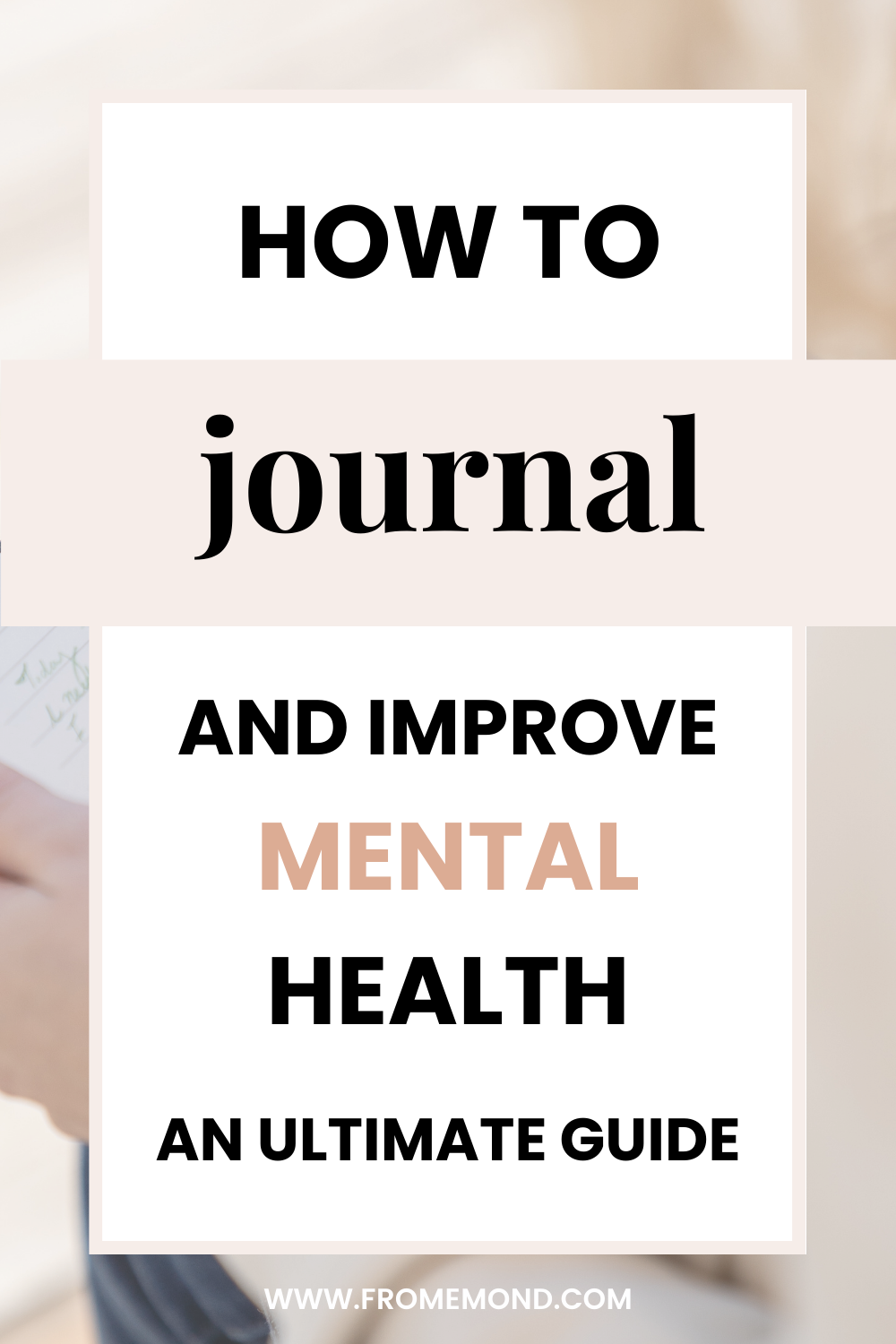
This post was all about how to start journaling.




Leave a Reply